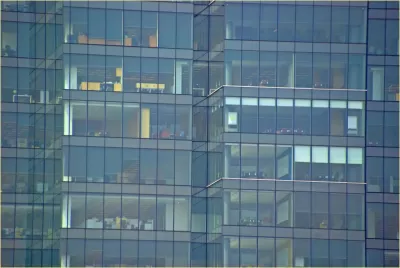An online calculator helps companies determine the broader impacts of their decisions to continue working remotely or return to the office.

Although remote work seems climate-friendly, "the reality is more complicated," writes Sarah Holder in Bloomberg CityLab. A new tool from Watershed Technology Inc. can help companies calculate the environmental impact of returning to the office or letting their employees continue working from home.
Watershed's website explains that, while remote work reduces the energy used in offices, it "shifts carbon: Emissions from energy and food still exist, but at employees’ homes, where they may be better or worse than in the office." Additionally, "a decentralized workforce might lead to more quarterly trips to meet face-to-face," and an exodus to the suburbs could mean increased carbon footprints for more households. The calculator lets companies "assess their greenhouse emissions more holistically, from the power their offices consume to the fuels burned in their supply chain" in order to "measure their impact, make plans to reduce it and make reports on progress."
When it comes to whether remote work is greener than returning to the office, "geography matters," says Holder. "The data analytics company ENGIE Impact suggested that if car commuting is already the status quo for employees at a given office, 'a reduction in commuting is the most reliable way to reduce carbon — even after factoring in the potential for increased energy use in a WFH environment.'" For companies whose employees already relied heavily on public transit, the reduction in carbon will be less impactful. According to Watershed, "the differences between cities are a result of different average household emissions per city, different electricity emissions based on which grid the city is a part of, and the mix of power generation for the grid, as well as average commute distances and respective transport mix for each city."
FULL STORY: The Environmental Implications of the Return to the Office

Study: Maui’s Plan to Convert Vacation Rentals to Long-Term Housing Could Cause Nearly $1 Billion Economic Loss
The plan would reduce visitor accommodation by 25,% resulting in 1,900 jobs lost.

North Texas Transit Leaders Tout Benefits of TOD for Growing Region
At a summit focused on transit-oriented development, policymakers discussed how North Texas’ expanded light rail system can serve as a tool for economic growth.

Using Old Oil and Gas Wells for Green Energy Storage
Penn State researchers have found that repurposing abandoned oil and gas wells for geothermal-assisted compressed-air energy storage can boost efficiency, reduce environmental risks, and support clean energy and job transitions.

Private Donations Propel Early Restoration of Palisades Playground
Los Angeles has secured over $1.3 million in private funding to restore the Pacific Palisades playground months ahead of schedule, creating a modern, accessible space that supports community healing after recent wildfires.

From Blight to Benefit: Early Results From California’s Equitable Cleanup Program
The Equitable Community Revitalization Grant (ECRG) program is reshaping brownfield redevelopment by prioritizing projects in low-income and environmental justice communities, emphasizing equity, transparency, and community benefits.

Planting Relief: Tackling Las Vegas Heat One Tree at a Time
Nevada Plants, a Las Vegas-based nonprofit, is combating the city’s extreme urban heat by giving away trees to residents in underserved neighborhoods, promoting shade, sustainability, and community health.
Urban Design for Planners 1: Software Tools
This six-course series explores essential urban design concepts using open source software and equips planners with the tools they need to participate fully in the urban design process.
Planning for Universal Design
Learn the tools for implementing Universal Design in planning regulations.
Ascent Environmental
Borough of Carlisle
Institute for Housing and Urban Development Studies (IHS)
City of Grandview
Harvard GSD Executive Education
Toledo-Lucas County Plan Commissions
Salt Lake City
NYU Wagner Graduate School of Public Service





























